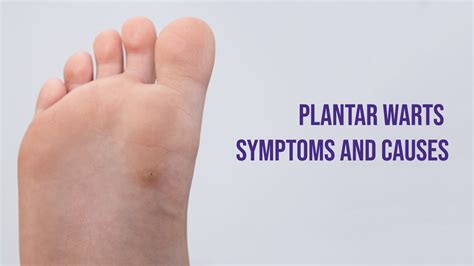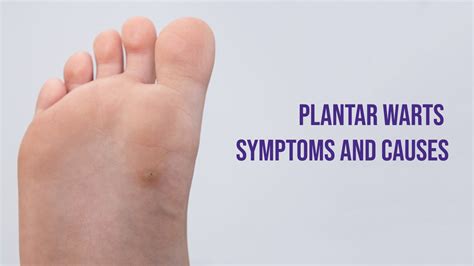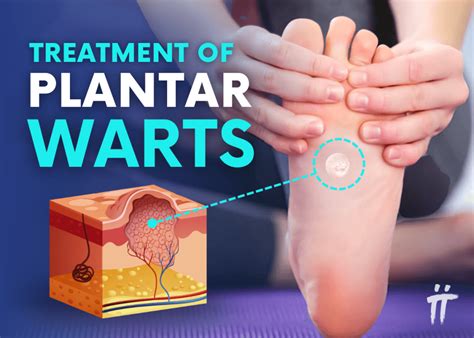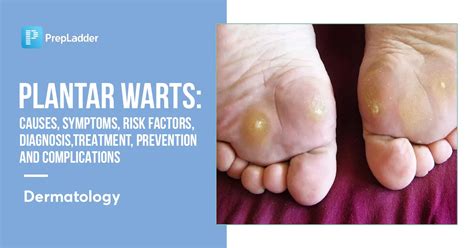Intro
Plantar warts on feet can be a frustrating and painful condition, affecting millions of people worldwide. These small, rough growths on the soles of the feet can cause discomfort, embarrassment, and anxiety. Understanding the causes, symptoms, and treatment options for plantar warts is essential to effectively manage and eliminate them. In this article, we will delve into the world of plantar warts, exploring their importance, and providing valuable insights into their treatment and prevention.
The importance of addressing plantar warts cannot be overstated. If left untreated, these growths can lead to increased pain, difficulty walking, and even spread to other parts of the body. Furthermore, plantar warts can be a sign of a weakened immune system, making it crucial to seek medical attention to prevent further complications. With the right treatment approach, individuals can regain comfort, confidence, and overall well-being.
Plantar warts are caused by the human papillomavirus (HPV), which enters the body through small cuts or cracks in the skin. The virus can be spread through direct contact with an infected person, contaminated surfaces, or by sharing personal care items. Once the virus has entered the body, it can take several months or even years for the wart to appear. Understanding the causes of plantar warts is essential to developing effective prevention strategies and treatment plans.
Understanding Plantar Warts

To effectively treat plantar warts, it is essential to understand their characteristics and symptoms. Plantar warts typically appear as small, rough growths on the soles of the feet, often with black dots in the center. They can be painful, especially when pressure is applied, and may cause discomfort while walking or standing. In some cases, plantar warts can also cause bleeding or discharge, leading to further complications.
Causes and Risk Factors

Several factors can increase the risk of developing plantar warts, including a weakened immune system, poor foot hygiene, and direct contact with an infected person. Individuals who participate in sports or activities that involve bare feet, such as swimming or gymnastics, are also at a higher risk of developing plantar warts. Understanding these risk factors can help individuals take preventive measures to reduce their likelihood of developing plantar warts.
Treatment Options for Plantar Warts
There are several treatment options available for plantar warts, including over-the-counter medications, prescription treatments, and home remedies. Over-the-counter medications, such as salicylic acid, can be effective in treating mild cases of plantar warts. Prescription treatments, such as cantharidin, may be necessary for more severe cases. Home remedies, such as duct tape occlusion therapy, can also be effective in treating plantar warts.Treatment Methods

Some common treatment methods for plantar warts include:
- Cryotherapy: This involves freezing the wart using liquid nitrogen, which can be painful and may require multiple sessions.
- Cantharidin: This is a prescription treatment that involves applying a blistering agent to the wart, which can be painful and may require multiple sessions.
- Salicylic acid: This is an over-the-counter medication that can be applied directly to the wart, which can be effective in treating mild cases.
- Duct tape occlusion therapy: This involves covering the wart with duct tape for an extended period, which can be effective in treating plantar warts.
Home Remedies for Plantar Warts

In addition to medical treatments, there are several home remedies that can be effective in treating plantar warts. These include:
- Tea tree oil: This essential oil has antiviral properties, which can help to combat the HPV virus.
- Garlic: This has antiviral and antibacterial properties, which can help to combat the HPV virus.
- Aloe vera: This has anti-inflammatory properties, which can help to reduce pain and discomfort.
- Banana peel: This can be applied directly to the wart, which can help to stimulate the immune system and combat the HPV virus.
Prevention Strategies
Preventing plantar warts is essential to avoiding the discomfort, pain, and anxiety associated with this condition. Some effective prevention strategies include: * Practicing good foot hygiene: This includes washing the feet regularly, especially after engaging in activities that involve bare feet. * Avoiding direct contact with infected individuals: This can help to reduce the risk of transmission. * Wearing protective footwear: This can help to reduce the risk of transmission and prevent the spread of the virus. * Avoiding sharing personal care items: This can help to reduce the risk of transmission.Complications and Risks

If left untreated, plantar warts can lead to several complications and risks, including:
- Increased pain and discomfort: This can make it difficult to walk or engage in daily activities.
- Spread of the virus: This can lead to the development of new warts, which can be painful and uncomfortable.
- Weakened immune system: This can make it more difficult for the body to fight off the HPV virus, leading to further complications.
- Bleeding and discharge: This can lead to further complications, such as infection and scarring.
Conclusion and Next Steps

In conclusion, plantar warts on feet can be a frustrating and painful condition, but there are several treatment options available. By understanding the causes, symptoms, and treatment options for plantar warts, individuals can effectively manage and eliminate them. It is essential to seek medical attention if symptoms persist or worsen over time. With the right treatment approach and preventive measures, individuals can regain comfort, confidence, and overall well-being.
We invite you to share your experiences and thoughts on plantar warts in the comments below. Have you tried any of the treatment options or home remedies mentioned in this article? What were your results? Your feedback and insights can help others who are struggling with this condition.
What are the symptoms of plantar warts?
+Plantar warts typically appear as small, rough growths on the soles of the feet, often with black dots in the center. They can be painful, especially when pressure is applied, and may cause discomfort while walking or standing.
How are plantar warts treated?
+Plantar warts can be treated with over-the-counter medications, prescription treatments, and home remedies. Some common treatment methods include cryotherapy, cantharidin, salicylic acid, and duct tape occlusion therapy.
Can plantar warts be prevented?
+Yes, plantar warts can be prevented by practicing good foot hygiene, avoiding direct contact with infected individuals, wearing protective footwear, and avoiding sharing personal care items.
What are the complications and risks of plantar warts?
+If left untreated, plantar warts can lead to increased pain and discomfort, spread of the virus, weakened immune system, bleeding, and discharge.
How long does it take to treat plantar warts?
+The treatment time for plantar warts can vary depending on the severity of the condition and the treatment method used. Some treatment methods, such as cryotherapy, can take several sessions to be effective, while others, such as salicylic acid, can take several weeks or months to work.
